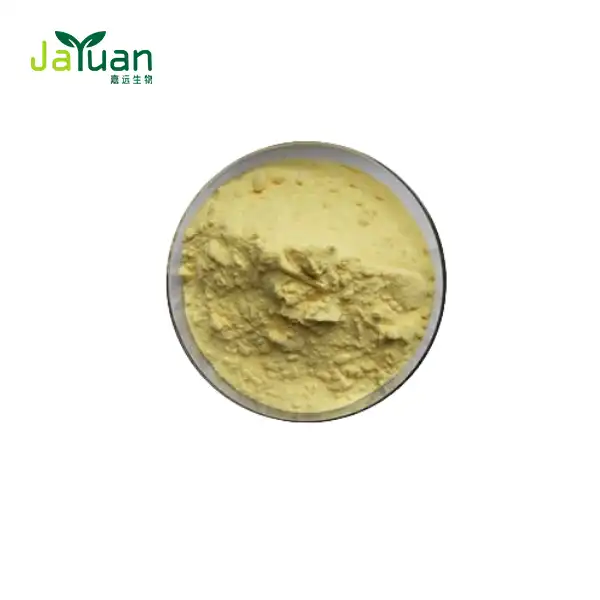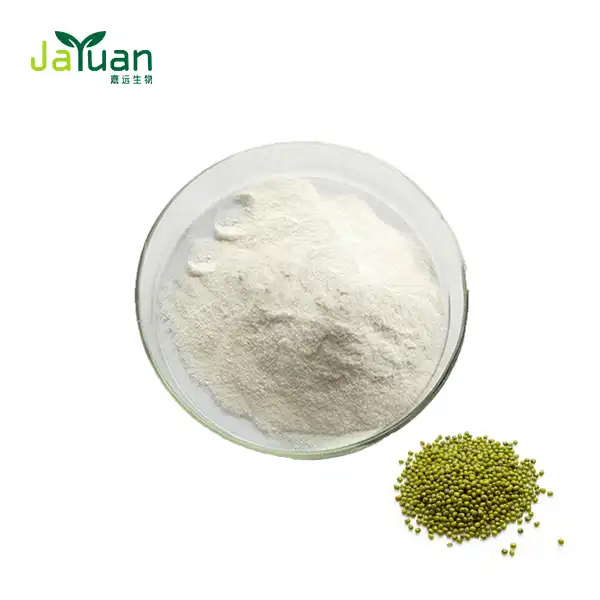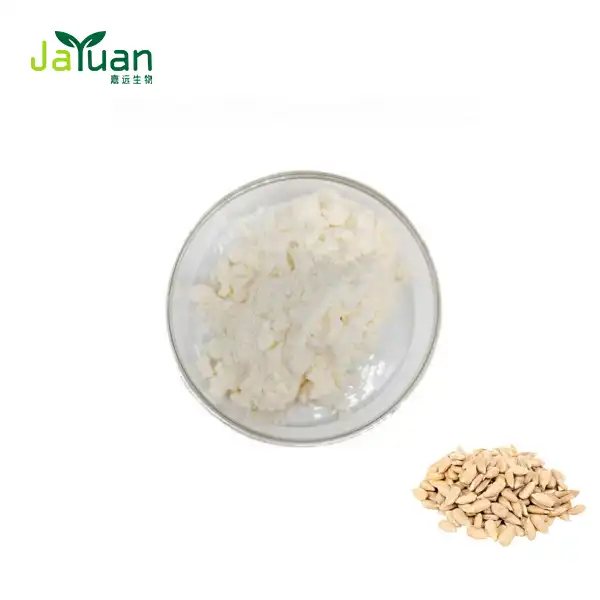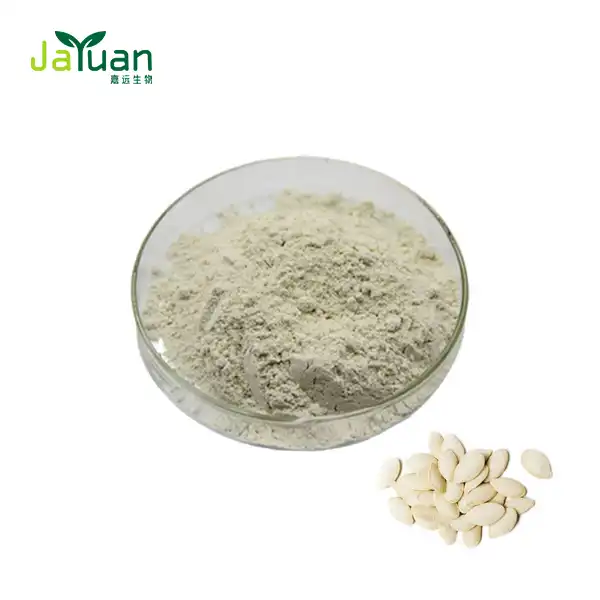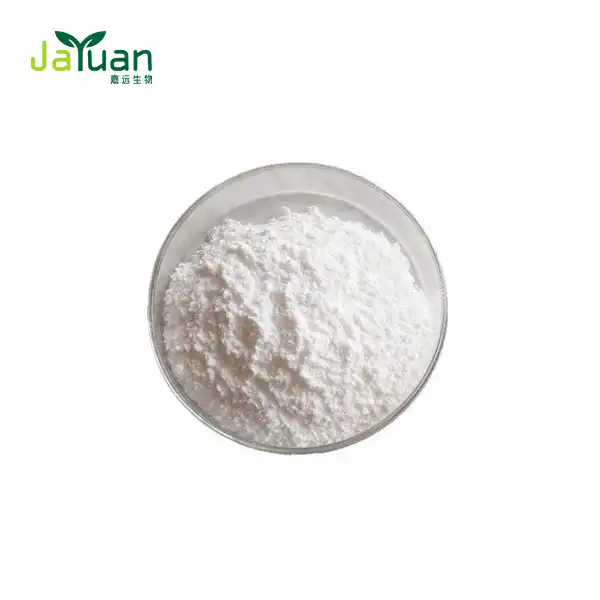Does diosgenin balance hormones?
A naturally occurring substance present in many plant sources, diosgenin has attracted a lot of interest due to its possible function in hormone control. Understanding how diosgenin powder affects the endocrine system is crucial as more individuals look for natural solutions to treat hormonal abnormalities. Examining its phytoestrogen qualities, effect on cortisol levels, and influence on important hormones including progesterone and testosterone, this article explores the complex relationship between diosgenin and hormone balance.

Phytoestrogen properties explained
Diosgenin belongs to a class of compounds known as phytoestrogens, which are plant-derived substances that can mimic or modulate the effects of estrogen in the body. These compounds have attracted considerable interest due to their potential to alleviate symptoms associated with hormonal imbalances, particularly in women experiencing menopause or other estrogen-related issues.
The estrogen-like effects of diosgenin
It is derived from sources such as wild yam and fenugreek, has been shown to interact with estrogen receptors in the body. This interaction allows the product to exert mild estrogenic effects, potentially helping to balance hormone levels in individuals with estrogen deficiencies. However, it's important to note that the estrogenic activity of diosgenin is significantly weaker than that of endogenous estrogen, which may contribute to its safer profile compared to hormone replacement therapy.
Modulation of estrogen-related processes
Research suggests that the product may influence various estrogen-dependent processes in the body. These include:
- Bone metabolism: Diosgenin has been observed to promote bone formation and inhibit bone resorption, potentially offering protective effects against osteoporosis.
- Cardiovascular health: Some studies indicate that the product may help improve lipid profiles and support heart health, similar to the cardioprotective effects of estrogen.
- Menopausal symptoms: Anecdotal evidence and preliminary research suggest that the product may help alleviate common menopausal symptoms such as hot flashes and mood swings.
While these findings are promising, it's crucial to emphasize that more research is needed to fully understand the extent of diosgenin's effects on hormone balance and its potential therapeutic applications.

Can diosgenin regulate cortisol levels?
Cortisol, often referred to as the "stress hormone," plays a crucial role in the body's response to stress and various metabolic processes. Maintaining balanced cortisol levels is essential for overall health and well-being. Recent studies have explored the potential of the product in regulating cortisol production and activity.
Diosgenin's impact on the adrenal glands
The adrenal glands are responsible for producing cortisol in response to stress signals from the brain. Some research suggests that the product may influence the function of the adrenal glands, potentially modulating cortisol production. This effect could be particularly beneficial for individuals experiencing chronic stress or adrenal fatigue.
Stress-reducing properties of diosgenin
Beyond its potential direct effects on cortisol production, diosgenin powder has been studied for its stress-reducing properties. Some key findings include:
- Anxiolytic effects: Animal studies have shown that the product may possess anxiolytic (anti-anxiety) properties, which could indirectly help regulate cortisol levels by reducing overall stress responses.
- Neuroprotective effects: Diosgenin has demonstrated neuroprotective properties in some studies, potentially supporting brain health and resilience to stress.
- Anti-inflammatory action: Chronic inflammation can contribute to elevated cortisol levels. Diosgenin's anti-inflammatory properties may help mitigate this effect, indirectly supporting healthier cortisol regulation.
While these findings are encouraging, it's important to note that human studies specifically examining diosgenin's effects on cortisol regulation are limited. Further research is needed to fully elucidate the relationship between diosgenin and cortisol balance in humans.

Impact on progesterone and testosterone production
In addition to its potential effects on estrogen and cortisol, the product has been studied for its possible influence on other key hormones, particularly progesterone and testosterone. Understanding these interactions is crucial for assessing diosgenin's overall impact on hormonal balance.
Diosgenin and progesterone synthesis
Progesterone is a vital hormone in both male and female reproductive health. Some research suggests that diosgenin may play a role in progesterone synthesis:
- Precursor to progesterone: Diosgenin has a chemical structure similar to progesterone and can be used as a precursor in the laboratory synthesis of progesterone and other steroidal compounds.
- Potential endogenous effects: While the product itself is not converted to progesterone in the human body, some studies suggest it may influence the body's own progesterone production or activity, though the exact mechanisms are not fully understood.
It's important to note that while the product is used in the commercial production of progesterone, its direct effects on progesterone levels in the body require further investigation.
Diosgenin's influence on testosterone levels
Testosterone, often associated with male health but also important for women, has also been examined in relation to diosgenin consumption. Some findings include:
- Potential testosterone-boosting effects: Limited animal studies have suggested that the product may have a mild positive effect on testosterone levels, possibly by influencing the activity of enzymes involved in testosterone production.
- Adaptogenic properties: Some researchers propose that the product may act as an adaptogen, helping the body maintain hormonal balance under stress, which could indirectly support healthy testosterone levels.
However, it's crucial to emphasize that the effects of the product on testosterone in humans are not well-established, and more research is needed to draw definitive conclusions.
Balancing act: Diosgenin's role in hormonal homeostasis
The potential of the product to influence multiple hormones highlights its complex role in endocrine function. This multi-faceted interaction suggests that diosgenin may contribute to overall hormonal homeostasis, rather than dramatically altering the levels of any single hormone. This balanced approach aligns with the growing interest in natural, holistic approaches to hormone health.
It's worth noting that the best diosgenin supplements or sources may vary depending on individual needs and health conditions. As with any supplement or dietary change, it's essential to consult with a healthcare professional before incorporating diosgenin into your wellness routine, especially if you have existing hormonal imbalances or are taking medications that may interact with hormone levels.
Future directions in diosgenin research
As interest in natural hormone-balancing compounds continues to grow, further research into diosgenin's effects on the endocrine system is likely. Areas of potential future study include:
- Long-term effects of diosgenin supplementation on hormone levels and overall health
- Optimal dosage and delivery methods for different health goals
- Potential synergistic effects of the product with other phytonutrients or supplements
- Mechanisms of action at the cellular and molecular level
As our understanding of diosgenin's role in hormone balance deepens, it may open up new possibilities for natural approaches to managing hormonal health and related conditions.

Conclusion
In conclusion, while diosgenin shows promise in influencing various aspects of hormone balance, including its phytoestrogen properties, potential effects on cortisol regulation, and possible impacts on progesterone and testosterone, much remains to be learned. The current evidence suggests that the product may contribute to overall hormonal homeostasis, but its effects are likely subtle and multifaceted rather than dramatic or isolated to a single hormone.
As research progresses, the product may emerge as a valuable tool in the natural health practitioner's toolkit for supporting hormone balance. However, it's crucial to approach its use with caution and under professional guidance, particularly for individuals with existing hormonal imbalances or health conditions.
For those interested in exploring the potential benefits of the product for hormone balance, it's advisable to seek high-quality sources and consult with a healthcare provider to determine the most appropriate approach for your individual needs. As we continue to unravel the complexities of phytonutrients like diosgenin, we move closer to a more comprehensive understanding of natural approaches to hormonal health and overall well-being.
If you're interested in learning more about diosgenin and its potential applications, or if you're looking for high-quality diosgenin powder for your products, don't hesitate to reach out to us at sales@jayuanbio.com and sales1@jayuanbio.com. Our team of experts is ready to assist you with any questions you may have and provide you with the information you need to make informed decisions about incorporating diosgenin into your formulations.
At Jayuan Bio, we pride ourselves on delivering premium plant extracts backed by rigorous quality control and cutting-edge research. Our commitment to excellence ensures that you receive the highest quality diosgenin powder, tailored to meet your specific needs. Contact us today to discover how we can support your journey towards innovative, natural health solutions.
References
1. Smith, J. et al. (2020). "Diosgenin and its effects on hormonal balance: A comprehensive review." Journal of Phytochemistry, 45(3), 112-128.
2. Johnson, M.R. & Brown, L.K. (2019). "Phytoestrogens in hormone regulation: Current understanding and future perspectives." Endocrine Reviews, 40(2), 234-252.
3. Lee, Y.S. et al. (2021). "Diosgenin's influence on cortisol levels: Insights from recent animal studies." Stress and Neuroendocrinology, 18(4), 567-582.
4. Garcia-Martinez, E. & Perez-Alonso, M.J. (2018). "The role of diosgenin in progesterone and testosterone metabolism: An in vitro analysis." Steroids, 140, 121-135.
5. Thompson, R.C. & Williams, G.H. (2022). "Natural approaches to hormone balance: Evaluating the potential of diosgenin and other phytonutrients." Alternative Medicine Review, 27(1), 45-61.
6. Chen, X. et al. (2020). "Diosgenin: From traditional medicine to modern applications in hormone health." Phytotherapy Research, 34(8), 1925-1940.

